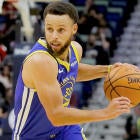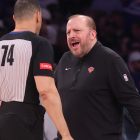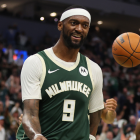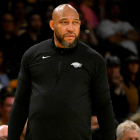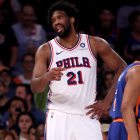The Golden State Warriors started the season by losing two games by a combined total of 47 points, so criticism was inevitable. One popular suggestion: The offense needs to change. Since the 2014 hiring of coach Steve Kerr, the Warriors have prioritized ball movement and player movement, empowering big men and non-spacing wings as facilitators. Stephen Curry grew up emulating Steve Nash and Reggie Miller; Kerr's system allowed him to become a true hybrid of his heroes, equally effective with and without the ball. With a much more limited roster, the thinking goes, Golden State needs to simplify the game. It no longer has a multitude of playmakers, so why not just give the ball to Curry or D'Angelo Russell on every possession and play like the Houston Rockets?
"I don't know that it's that simple," Kerr told reporters on Monday prior to the Warriors' 134-123 win against the New Orleans Pelicans, via The Athletic's Anthony Slater. "We could turn [Curry] into James Harden and give him the ball every play, but that's really hard to do. You have to build a team for that. Houston has put five shooters on the floor for years now with Harden to give him that space. We don't have that kind of personnel. There's not the same spacing. That kind of basketball wears you out, too. Especially for a guy who's 180 pounds like Steph is. So I don't think the answer is just run a million high screens. We don't really have the personnel for that. I don't think it makes a ton of sense from Steph's standpoint."
Kerr's argument against running a million high screens is a practical one, not a philosophical one. Skeptics, however, would say it is awfully convenient that it aligns with his philosophy. Over the years, there has been little mystery about how Kerr sees the game.
From a May 2018 feature by Business Insider's Scott Davis: "I suppose I'm a little more egalitarian in my approach than Mike [D'Antoni]. Mike believes in, you got a great player, you give him the ball every time, in Harden and Nash, and it's very effective. And I feel, maybe because I was a role player myself, I feel there's a power in everybody touching the ball and everybody sharing in the offense. There's nobody who's right or wrong."
From a November 2017 feature by ESPN's Baxter Holmes: "Iso basketball, where one guy is going one-on-one and everybody is standing around, I don't like that. I don't like that at all."
Kerr fundamentally believes that offense should be unpredictable. Those who say he fetishizes passing for the sake of passing are off-base -- he doesn't like overpassing, and he doesn't want shooters to hesitate when they're open -- but he told Holmes that "the more people who are involved in the offense, the more powerful it becomes."
Every coach, however, has to make roster-based compromises. D'Antoni made his name coaching the fastest team in the league and putting an end to an era of methodical, isolation-based basketball, but in the last couple of seasons his Rockets slowed to a crawl and iso'd opponents to death. Even Kerr has proven adaptable -- Golden State has typically run more pick-and-rolls at the end of close games and against elite playoff defenses, and he didn't disagree with Kevin Durant's recent assessment that the team could "totally rely on only our system for maybe the first two rounds."
When Durant was on the roster, Kerr's challenge was balancing the Warriors' famous flow with the superstar's individual brilliance. That is a luxurious problem compared to his current one: finding that flow without proven NBA players on the wing or at center. Kerr might be right that they don't have the requisite shooting to play like the Rockets do, but they don't have the personnel to play the old way, either. Their early-season lowlights have been extremely low:
From a purely analytical perspective, the best thing to do when you have a top-heavy team is to play through your best creators and simplify the game for everyone else. I love ball movement as much as the next guy, though, and I appreciate Kerr's commitment to building a team that can be more than the sum of its parts. Curry, at his core, is different than Harden because his movement is such an incredible weapon. Kerr would be foolish not to use that, even if he should be running pick-and-rolls and letting Curry hunt mismatches more frequently.
"What we have to figure out is how can we free [Curry] up better," Kerr told reporters, again via Slater. "Those are the things we are exploring every day. How can we free him up without having the floor-spacing bigs that are popular around the league? So trying to create space, trying to create penetration, trying to create clean looks and an offensive rhythm within all that. That's the challenge, that's what we're working on."
The hope for the Warriors is that their issues on offense are not all about the offense. They looked lackadaisical and disconnected in their first two games, and on Monday the energy was different from the opening possession, on which Draymond Green faked a hand-off to Curry and attacked the rim for a quick layup. They also have the league's worst defensive rating, per Cleaning The Glass, and you can't separate that completely from their struggles with scoring. If they can be merely below average rather than awful on that end, then they will have an easier time playing with pace and rhythm, as well as simply creating more high-percentage opportunities in transition. It's also worth noting that Damion Lee, easily the most important player signed to a two-way contract, went off for 23 points in 28 minutes against New Orleans -- he and rookie gunner Jordan Poole combined to shoot 7 for 11 from deep.
Lee and Poole might not be reliable every night, but maybe Alec Burks will make a difference when he comes back from injury. The absence of big men Kevon Looney and Willie Cauley-Stein cannot be ignored, either. As the Warriors get healthier and establish some semblance of chemistry, you can expect them to improve. If that improvement is not drastic, though, Kerr will face more questions about making a stylistic shift.













